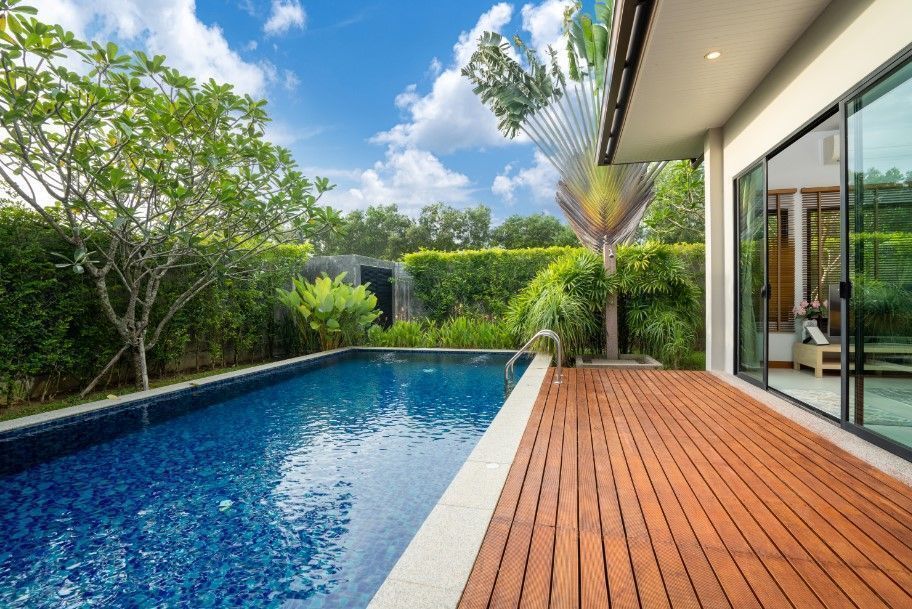Are you planning to construct a pool on your property or in your yard? If yes, then the most common question that must be raised in your mind is what are the suitable pool construction materials?
Indeed, building a pool is a big project, and picking the right firm is the main thing. But it would help if you recognized the importance of the materials. There are many choices available, like wood, concrete, fiberglass, and steel.
Which to choose and which not to choose is the main query. Choosing the right pool construction materials in Pakistan is a must because it affects the aesthetics, durability, maintenance, and overall cost. So now let us look at each material individually, with its pros and cons.

The Main Swimming Pool Construction Material Options
In Pakistan, various swimming pool building materials are available, each with its own pros and cons. Whether you are planning to build an infinity pool or a wave pool, no material is completely free from drawbacks. The choice of material plays a vital role in the aesthetics of the pool. So, before you learn how to choose the right pool construction materials, read this.
1. Concrete
It comes first on the list. Concrete is one of the most commonly used materials for building pools. Longevity and strength are the main characteristics of this stuff.
It can mold into any shape, allowing the builder to build the pool in any size and shape. So, in short, it is the best material for building a swimming pool at home. Now let us look at its pros and cons.
Pros
Durability
Unlike other materials, Concrete pools are durable and can last decades with proper pool maintenance. They are resistant to damage and can withstand various weather conditions.
Customizability
It is one of the notable perks of the concrete swimming pool. As stated before you can tailor it in any shape and size as per your choice. Hence, they are ideal for unique or irregularly shaped spaces.
Aesthetic Flexibility
You can give a finishing touch to the pool with various materials like pebbles, tiles, platters, and others. It allows for a vast range of aesthetic options.
Cons
Cost
Now let us talk about the cost. Concrete pools are generally more costly than others. Why is that so? This is because it requires extensive labor and time.
Maintenance
These swimming pools need regular maintenance, like resurfacing every 10–15 years, to prevent cracking and algae growth.
Construction Time
Building a concrete pool is a time-consuming process, often taking many weeks from start to finish.
Concrete pools are the right choice for those seeking a durable, lasting, and highly customizable pool. However, they come with higher initial costs and maintenance requirements.
2. Wood
Wood is a natural, warm, and beautiful material. Wooden pools fit nicely into any landscape. They are also easy to install and maintain. Hence, it could be a good pick for pool owners.
The best thing about a wooden pool is that you can install it both above ground and semi-inground. It offers a rustic look and, when treated, can withstand pests and weathering. There are multiple perks to installing a wooden pool, making it a good choice for any setting.
Pros
Natural Look
The wood swimming pool has a warm, natural aesthetic that blends with outdoor surroundings.
Aesthetic Look
They are appealing and can boost beauty.
Easy to Install
Wooden pools are relatively easy and quick to install compared to other pools.
Eco Friendly
Wood is a renewable resource. Hence, these pools are more eco-friendly.
Customization
Wood can be easily customized to various shapes and sizes.
Cost Effective
Wooden pools can be more affordable than some other types, such as concrete or natural stone.
Cons
Maintenance
Concrete wood needs regular maintenance, like sealing and treating. It is to prevent rot and insect damage.
Durability
Wood is less durable than stuff like concrete or fiberglass. It may need more frequent repairs.
Weather Sensitivity
Wood is sensitive to the weather. Moisture and extreme temperatures can lead to cracking and warping.
Lifespan
When we talk about life spans, these pools have shorter lifespans than pools made from more durable materials.
Chemical Reactions
Pool chemicals can sometimes negatively affect wood. Therefore, it needs careful monitoring and maintenance.
Safety
If properly maintained, wood can avoid becoming slippery and pose safety risks.
Indeed, choosing the right pool construction materials is a tricky thing. If you are planning to go with the wood, do study its pros and cons. It will help you to decide whether to go for it or not. If you want an aesthetically pleasing and cost-effective, then it is a good pick for you. But do not ignore the maintenance part.
3. Fiberglass shell
It comes next on the swimming pool materials list. They make the fiberglass shell by spraying fiberglass and resin later into the mold. Here, the resin binds the fiberglass together. Therefore they create a watertight and robust structure. They finish the look with a gel coat. The finished swimming pool is watertight and robust. Besides this, it is also aesthetically pleasing with its glossy and finished look.
Pros
Low Maintenance
It has a non-porous and smooth surface that resists algae growth. Besides this, it also reduces the need for chemical treatment.
Quick Installation
The best part about this type of fiberglass pool is that it is easy to install.
Durability
It is a strong material that offers excellent resistance against cracking and can last for years with less maintenance.
Smooth Surface
The smooth surface of fiberglass is gentle on the skin and prevents abrasions.
Cost-Effective & Long-Term
Though the initial cost may be higher, the lower maintenance costs over time make it more cost-effective.
Resistant to Staining
Fiberglass pools are less likely to stain compared to other materials. Hence, they remain clean and attractive for a long time.
Cons
Limited Sizes and Shapes
Fiberglass pools come in pre-determined shapes and sizes, which limits customization options.
Higher Initial Cost
The cost of the fibreglass pool shell is higher than that of vinyl liner pools.
Transportation Limitations
The transportation constraints restrict the fiberglass pool shell. It may not be suitable for all types of properties.
Repairs Can Be Tricky
So here is another drawback of the fiberglass pools:. It can be damaged easily and the repair can be expensive and complicated.
Fade Easily
Exposure to sunlight and chemicals can cause the color of the fiberglass to fade.
Installation Requirements
Proper installation is vital to avoid issues like bulging or floating. So it means you need experienced installers.
4. Natural Stone Pools
Natural stone pools consist of materials such as sandstone, granite, limestone, or marble. Therefore, it creates a luxurious and aesthetically pleasing swimming ambiance. These pools blend seamlessly with natural landscapes and add to the beauty.
Pros
Aesthetics
Natural stone pools are lovely. You can customize it to look unique and luxurious.
Durability
Stone is strong and can handle various weather states and heavy use.
Heat Retention
Stone pools keep the water warm for a longer time.
Cons
Cost
Natural stone pools cost more because the materials and labor are expensive.
Maintenance
Stone surfaces can get algae and need regular cleaning and sealing.
Natural stone pools are the best pick for those looking to create a luxurious and natural-looking swimming ambiance.
5. Tile Pools
They build the pool using ceramic, glass, or porcelain tiles. Here, builders apply these tiles over concrete shells. Hence, the builder offers tailored and aesthetically pleasing choices.
Pros
Aesthetic Appeal
Tile pools come in many designs with lots of colors, patterns and materials to choose from.
Durability
Tiles are very strong and resistant to chemicals so they last a long time.
Easy to Clean
The smooth surface of tiles makes them easy to clean and care for.
Cons
Cost
Tile pools can be pricey to install because the materials and labor cost a lot.
Installation Time
Installing a tile pool takes a long time and requires skilled workers.
Maintenance
Even though tiles are strong, the grout lines can crack and need regular upkeep.
Choosing the Right Pool Construction Materials
Budget
Your budget is significant when choosing pool materials. Concrete and natural stone pools are usually more expensive.
Climate
The climate where you live matters too. Concrete pools are suitable for areas with changing temperatures.
Aesthetics
How your pool looks is also important. Materials like natural stone and tile look lovely and can make your pool look fancy.
Maintenance
Different materials need different levels of care. Fiberglass is hard to take care of. Concrete and tile pools need more regular maintenance.
Longevity
Think about how long you want to keep the pool and how the material will last over time. Concrete and natural stone pools last a long time but might need resurfacing. Fiberglass and composite pools also last a long time and require less maintenance.
Safety
Safety is a must, mainly if you have kids or elderly family members. Some natural stones can be slippery when wet, which might be dangerous.
Customization
Concrete and tile pools offer the most flexibility if you have a specific design in mind.
Conclusion: Choosing the Right Pool Construction Materials
So now you have learned about the type of pool construction material and learned how to choose the right material for the pool. Pick the one based on your preferences and choices. Also, consider the weather in Pakistan when choosing the right pool construction materials For swimming pool construction and maintenance services in Pakistan, contact us now to get started.





